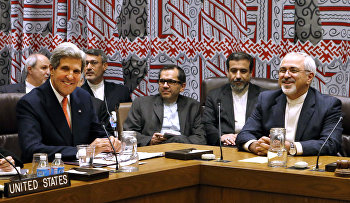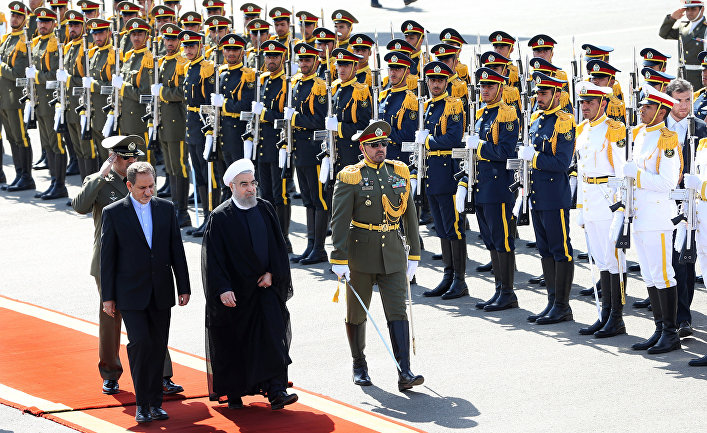Once Russia and China displayed their own commitment to playing a more active and direct role in the Syrian crisis, the issue of Iran's position on this matter cropped up once more in numerous political circles. Critical nuances on this matter have emerged. One of them is why the US's position on Iran's role in resolving the Syrian crisis has changed – while another is the degree to which the Islamic Republic calls the shots in the most recent developments in Iran.
The variety of differing reports now appearing on Russia's increased military operations in Syria is wide – with China's role also under discussion. In parallel with this, the annual UN General Assembly meeting was transformed into a platform for diplomatic talks to decide Syria's future. With all this in mind, the attention of international media is now directed towards what Washington's feelings might be concerning Iran's involvement in patching up the Syrian crisis.
Syria's President Assad: Coalition with Syria, Russia, Iran & Iraq must succeed or whole region faces destruction http://t.co/boeFy75qXX
— BBC News (World) (@BBCWorld) October 4, 2015
On September 27th the New York Times devoted a piece to this subject, in which it wrote: “US Secretary of State John Kerry, who has turned to the UN General Assembly as a place for diplomatic discussion of the Syrian crisis, is now trying to attract Iran towards the search process for a political solution to this issue.” Reporting on Kerry's meeting with Iran's Foreign Affairs minister, the NYT quoted Secretary Kerry as saying “I view this week as a major opportunity for any number of countries to play an important role. We need to achieve peace and a way forward in Syria, in Yemen, in the region itself.”
Good meeting with P5+1 colleagues and #Iran on implementation of @TheIranDeal. pic.twitter.com/5x2vLZLak9
— John Kerry (@JohnKerry) September 29, 2015
Meanwhile NYT journalists are commenting that in early 2014 — when numerous countries were preparing for an international peace conference on Syria — it was the American government which used various pretexts specifically to exclude Iranian participation in the talks. At that time, Kerry insisted that Tehran's position on this issue was nonconstructive, and unable to offer positive results.
We have repeatedly said that the only way to uproot terrorism in MidEast is by targeting its underlying social, economic and cultural causes
— Hassan Rouhani (@HassanRouhani) September 28, 2015
Despite this, the authors of the NYT piece go on to suggest that the reason the USA has made a policy u-turn in this area has been the maelstrom of interrelated setbacks which have occurred both in Syria and internationally. Probably the most significant of these have been the unprecedented growth in the power of the ISIL terrorist organization; the growing streams of refugees heading for Europe, which have prompted a separate crisis of their own for the Old World; the absence of any international peace negotiations involving all interested sides; and of course, Russia upping the military ante by the presence of its armed forces in Syria. The result is that at present, the US has no option but to bring Iran into this issue, in its role as a key supporter of the Syrian government – by way of recovering the US's initiative in the process of diplomatic negotiations.

Alongside the publication of the NYT article, analytical material has been published in The Guardian newspaper in Britain. This emphasized that the achievement of the last truce in Syria confirmed Iran's authority in the region. It still remains unclear how long the twenty-five key points of the truce will last – an agreement signed by the Syrian government and a coalition of its armed terrorist-group opponents known as Jaysh al-Fatah, and mediated by Turkey and Iran. Even so, the involvement of Iran as a mediator and negotiator on behalf of the Syrian government is proof that the Islamic Republic is playing a special role in Syrian affairs.
Against this, the Guardian writes, is the fact that the truce came alongside the ramping-up of a Russian military presence in Syria — serving as evidence that the bolstered efforts of Russia and Iran in providing assistance to the Damascus government have had both a unilateral and mutually cumulative effect.
David Cameron: Russia and Iran will not accept Syria without Assad http://t.co/HfiN61j1Ph
— The Guardian (@guardian) September 29, 2015
It can be seen that four years after the outbreak of military hostilities in Syria, the West formed the clear impression that achieving realistic and sustainable compromise to resolve the Syrian crisis would necessarily involve Iran. A whole raft of recent events, both within Syria and internationally, go towards supporting that viewpoint now.






